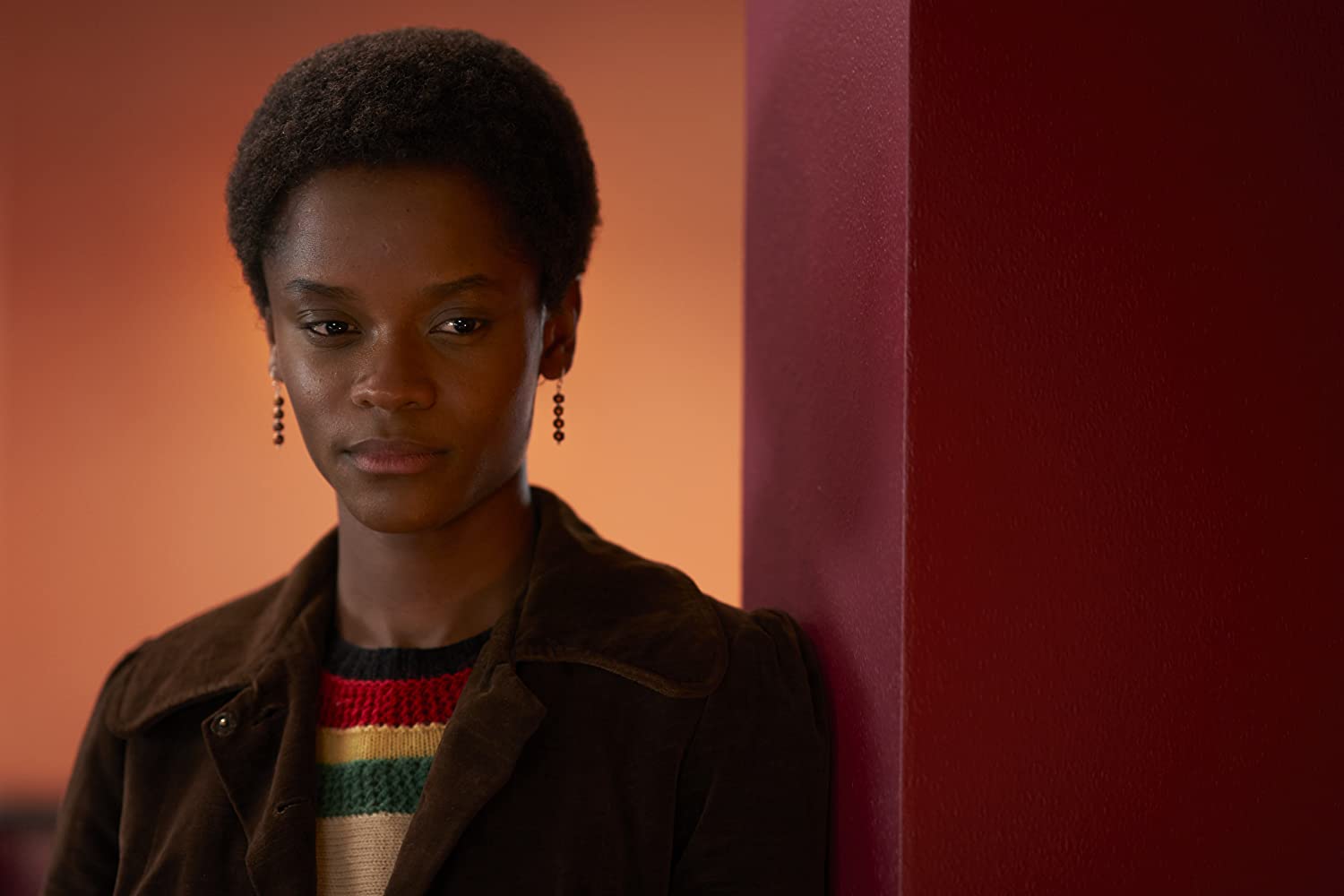Mangrove, the second film from Steve McQueen’s Small Axe anthology series to premiere at the 58th NYFF, covers the incidents precipitating, and including, the trial of the Mangrove Nine, a group of British Black activists unduly tried for inciting a riot during a demonstration against the Metropolitan Police. The Mangrove, a West Indian restaurant in the Notting Hill area, was a crucial space for the surrounding Black community, and was the meeting place for many prominent intellectuals and Black Panther activists, like Darcus Howe (Malachi Kirby), Altheia Jones-LeCointe (Letitia Wright), and Barbara Beese (Rochenda Sandall). The Metropolitan Police sought fit to constantly harass its owner, Frank Crichlow (Shaun Parkes), and repeatedly raid the restaurant under suspicion of gambling, prostitution, and drug use. When a protest against the police turned violent, Crichlow and other community members find themselves on trial defending their right to exist against a colonialist system all too prepared to classify them as thugs.
The injustice inflicted against the Mangrove and the Black community will enrage anyone with a working soul, and the solidarity expressed in response to such oppression is genuinely moving. McQueen and co-writer Alastair Siddons characterize the actions of Crichlow, Howe, and the others as the only appropriate response to such state-sanctioned subjugation. Shabier Kirchner’s unshowy long takes capture both unencumbered Black joy of music and parades, as well as the organizing and political expression necessary to move freely in British society. McQueen’s formal commitment to depicting life as lived, and the systemic violence as a prejudicial and needless infringement on life as lived, effortlessly gels with the genre demands of a courtroom drama, situating the audience on the side of the oppressed while also illustrating the reasons for that oppression.
Mangrove sparks brightest whenever McQueen employs visually unconventional methods to capture otherwise standard scenes. He captures Crichlow and Howe’s decision to demonstrate against the police in a lengthy, composed static shot, in which a table remains focal while Parkes and Kirby are given space to move. He lingers on a rolling kitchen bowl in the aftermath of a police raid, illustrating the effects of racial violence, trickling down from bruised bodies to tossed kitchen objects, persist even after the perpetrators leave. Both jury deliberations and the reading of the verdict are captured in tight close-ups of Parkes’ face. Kirchner’s woozy photography tends to stay on scenes longer than narrative films normally dictate, giving adequate space to impassioned monologues from Wright and Kirby as well as uglier scenes of racial abuse. McQueen and Siddons move through typical genre beats from the courtroom drama, but rarely does Mangrove move in typical ways. One only needs to hear the dulcet tones of Toots and the Maytals scored to scenes of a stuffy British courtroom for McQueen’s intervention to be made clear.
Other times, however, McQueen relies upon transparent reaction shots, room coverage, or otherwise crowd-pleasing choices to needlessly goose up the drama. Consider Howe’s righteous closing statement to the jury, in which he unequivocally details Britain’s systemic racism and how it both defines and discredits the charges laid against him and the other defendants. It’s a powerful scene, both how it’s performed by Kirby performance and written by McQueen and Siddons, and yet it’s undermined by McQueen’s choice to break it up with shots of the jury and the spectators listening intently. The across-the-board stellar performances always invigorate every scene, but Mangrove frustrates whenever McQueen defaults to less rigorous visual strategies.
Mangrove does reach a point in which every scene communicates the same ideas, about institutional racism, about the political and judicial systems designed by a white colonialist nation to uphold it, and about the tension the Black community faces every day. These ideas are undeniably relevant and potent, but eventually McQueen and Siddons’ variations and riffs on them become dramatically static. Yet, McQueen also continually finds way to draw audiences back in, like a photo still montage or a well-timed edit or just by allowing his performers to deliver a line in an offbeat manner. He livens up the film simply by trusting the efficacy of the frame and communicating it in irregular ways. By the time the triumphant “Pressure Drop” closes the film, Mangrove reaches a comfortable pitch that feels familiar but also admirably askew.
Mangrove premiered at the 58th New York Film Festival.

